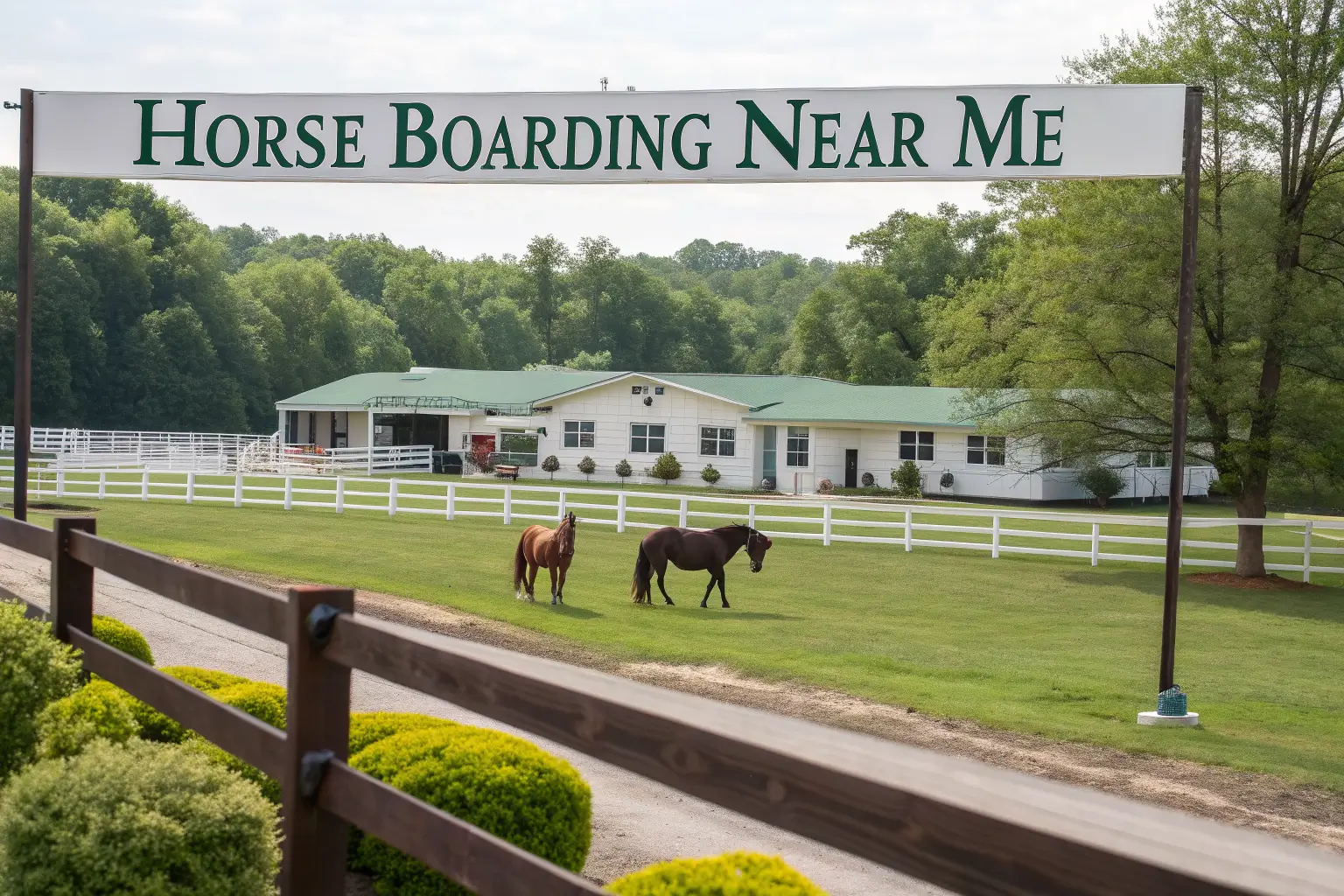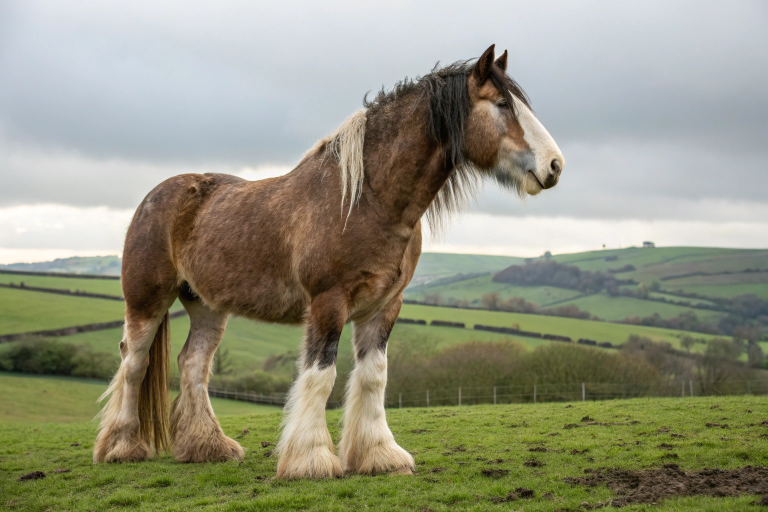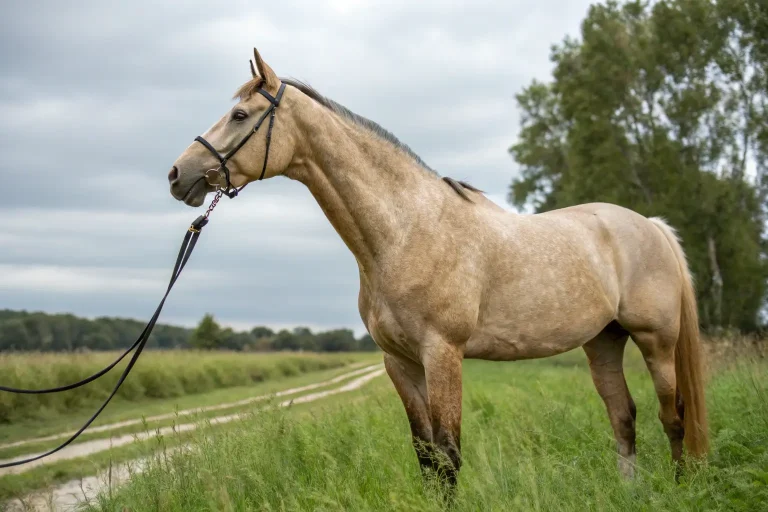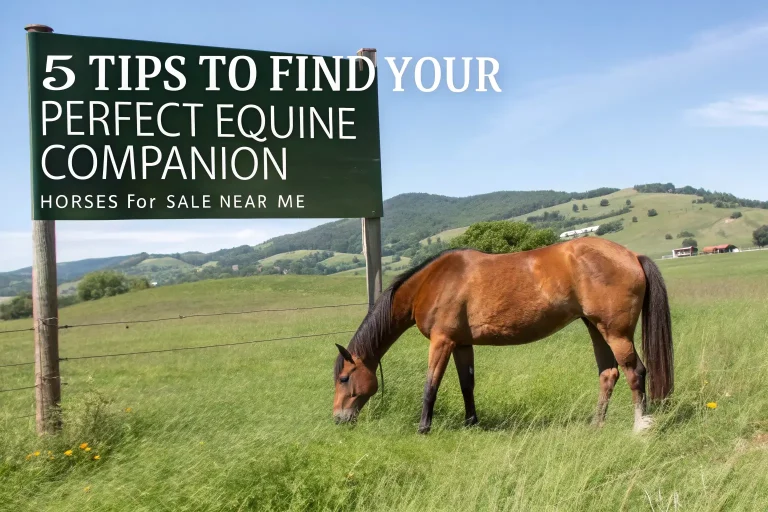Horse Boarding Near Me: 7 Tips for Choosing the Best Stable!
Introduction
Finding quality horse boarding near me was one of the most challenging aspects of horse ownership I faced when I moved to a new area. Your horse deserves exceptional care when you can’t be there, making the selection of the right boarding facility crucial for both your peace of mind and your equine companion’s wellbeing. The right stable doesn’t just provide shelter—it creates an environment where your horse can thrive physically and mentally.
When searching for “horse boarding near me,” the options can feel overwhelming. From full-service stables with all-inclusive amenities to simple pasture boarding arrangements, the variations in services, costs, and quality can make the decision daunting. That’s why I’ve compiled these essential tips based on both professional advice and my personal experiences to help you navigate this important decision.
Did you know? The average horse owner spends between $400-$1,500 monthly on boarding alone, depending on location and services provided. Making the right choice isn’t just about your horse’s happiness—it’s a significant financial commitment too.
What to Consider When Searching for Horse Boarding Near Me
Before diving into specific tips, understanding what horse boarding actually entails is crucial. Horse boarding facilities are professional establishments that provide care and housing for horses whose owners cannot accommodate them on their own property. These facilities typically offer various service levels:
- Full-service boarding: Includes stall cleaning, feeding, turnout, and basic care
- Partial or self-care boarding: Owners handle most care responsibilities while the facility provides the space
- Pasture boarding: Horses live primarily outdoors with shelter access and basic care
Your search for “horse boarding near me” should align with your horse’s needs, your budget, and how much time you can dedicate to daily care. Now, let’s explore the seven essential tips for finding your perfect match.
Tip 1: Assess the Facility’s Safety and Infrastructure
When evaluating potential stables during your “horse boarding near me” search, safety should always be your primary concern. A facility might look picturesque, but structural integrity and thoughtful design are far more important than aesthetics.
What to Look For:
Fencing quality: Secure, well-maintained fencing without protruding nails, loose boards, or dangerous materials. Look for sturdy materials like oak boards, vinyl, or properly installed high-tensile wire (avoid barbed wire).
Stall safety: Minimum 12×12 stalls for full-sized horses with proper ventilation, no sharp edges, secure doors, and safe hardware. Rubber mats or adequate bedding should cushion the floor.
Pasture hazards: Check for debris, holes, poisonous plants, or areas where horses could become trapped. Adequate drainage prevents mud accumulation.
Fire safety measures: Extinguishers, smoke detectors, evacuation plans, and clear access for emergency vehicles.
Lighting: Well-lit barn aisles, arenas, and pathways for safety during evening care.
One of my clients recently chose a boarding facility that looked stunning from the outside but discovered the stall doors lacked secure latches, allowing her escape-artist gelding to free himself repeatedly. This preventable safety issue caused unnecessary stress and risk.
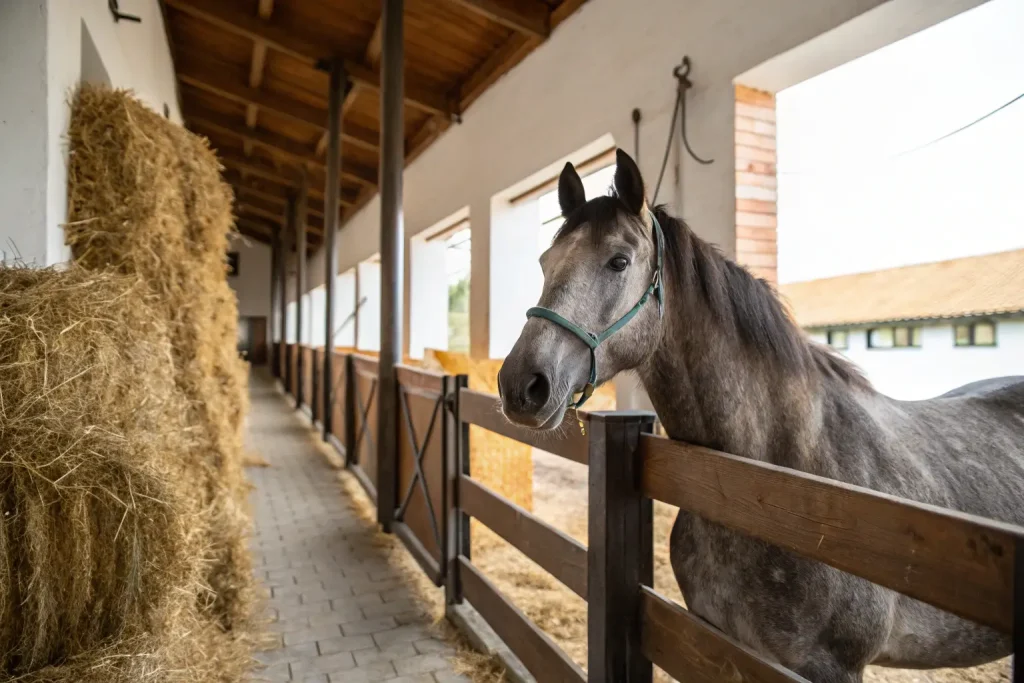
Tip 2: Evaluate Staff Expertise and Horse Care Protocols
When searching for “horse boarding near me,” remember that you’re not just choosing a facility—you’re selecting the people who will care for your horse daily. The knowledge and attentiveness of the staff directly impact your horse’s wellbeing.
Questions to Ask:
Staff qualifications: What experience and education do the primary caretakers possess? Do they have specialized training in equine first aid?
Staff-to-horse ratio: How many horses does each staff member oversee? Lower ratios typically mean more attentive care.
Feeding schedule: How often are horses fed? Are feeding times consistent? Can special diets be accommodated?
Health monitoring: How often are horses checked? What’s the protocol when a horse appears ill or injured?
Medication administration: Can staff administer medications if needed? How are these documented?
Turnout protocols: How often are horses turned out? Are turnout groups chosen thoughtfully based on compatibility?
I once boarded at a facility where the owner had 40+ years of experience and could spot subtle signs of colic before most veterinarians. This expertise saved my mare when she developed an impaction that showed only the slightest behavior changes. The value of knowledgeable staff cannot be overstated when searching for “horse boarding near me.”
Tip 3: Consider Available Amenities and Riding Facilities
The amenities offered at boarding stables vary dramatically, affecting both your horse’s quality of life and your riding experience. When researching “horse boarding near me,” consider what features matter most for your equestrian goals.
Common Amenities to Evaluate:
- Riding spaces: Indoor arena, outdoor ring, round pen, trails
- Footing quality: All-weather footing, proper drainage, regular maintenance
- Wash stalls: With hot/cold water, good drainage, proper lighting
- Tack storage: Secure, climate-controlled areas for personal equipment
- Trailer parking: Designated, accessible parking for horse trailers
- Grooming areas: Cross-ties, proper lighting, tools available
- Turnout options: Individual paddocks, group pastures, run-in sheds
Beyond the basics, some premium facilities in my “horse boarding near me” search offered specialized amenities like:
- Eurocisers or hot walkers for controlled exercise
- Therapy options (salt rooms, water treadmills, vibration plates)
- Climate-controlled indoor arenas for year-round comfortable riding
- Wash stalls with heat lamps for winter bathing
The amenities you prioritize should align with your discipline and goals. A competitive dressage rider might require a regulation-sized arena with mirrors, while a recreational trail rider might value direct trail access more highly.
Tip 4: Understand the Fee Structure and Contract Terms
When searching for “horse boarding near me,” understanding exactly what you’re paying for is essential. Boarding costs vary widely based on location, services, and amenities, typically ranging from $200-$2,000+ monthly.
Financial Considerations:
- Base boarding fee: What’s included in the standard monthly rate
- Additional services: Extra charges for blanketing, supplement feeding, holding for vet/farrier
- Hay and feed quality: Type and amount of hay provided, concentrate options
- Bedding type and frequency: Shavings, straw, pelleted bedding; how often stalls are cleaned
- Facility use fees: Are there additional costs for arena use or lessons?
- Contract terms: Notice period required, deposit policies, payment due dates
One warning sign I discovered during my “horse boarding near me” search was a stable with unusually low advertised rates that charged extra for services most facilities include standard. After adding up all the “additional” fees, the total monthly cost exceeded nearby full-service options.
Always request a detailed breakdown of all potential charges and get everything in writing. A comprehensive boarding contract protects both you and the facility owner.
Tip 5: Research the Stable’s Reputation and Management Style
The reputation of a boarding facility speaks volumes about what you can expect. When conducting your “horse boarding near me” search, dig beyond the facility’s own marketing.
How to Research Effectively:
- Current boarder feedback: Speak with multiple current clients for their honest assessments
- Previous boarder insights: Why did people leave? Patterns in complaints?
- Professional connections: Ask trusted veterinarians, farriers, or trainers about the facility’s reputation
- Management philosophy: Is the barn run with rigid rules or flexible accommodation?
- Conflict resolution: How are disagreements between boarders handled?
- Longevity: How long has the facility been in operation? Stability often indicates good management
During one “horse boarding near me” search, I found a beautifully maintained facility with excellent amenities, but further investigation revealed high boarder turnover due to the owner’s confrontational management style. This insight saved me from a potentially stressful boarding situation despite the appealing physical facility.
Social media can provide valuable insights—check Facebook groups for your local equestrian community where people often discuss their boarding experiences candidly.
Tip 6: Consider Location and Accessibility
The most perfect stable won’t work for you if its location makes regular visits challenging. When searching for “horse boarding near me,” the “near me” part deserves serious consideration.
Location Factors to Evaluate:
- Travel time: Realistically, how often will you visit given the commute?
- Road conditions: Are roads well-maintained year-round? Consider winter access if applicable.
- Visiting hours: Are there restrictions on when you can visit your horse?
- Proximity to resources: Distance to veterinary services, feed stores, and equine hospitals
- Climate considerations: Does the location experience extreme weather that could affect care?
- Security: Is the facility in a safe area? Are there security measures in place?
I’ve known dedicated horse owners who chose facilities 45+ minutes away for superior care or amenities, but this arrangement requires honest assessment of your schedule and commitment. When conducting your “horse boarding near me” search, consider that a slightly less perfect facility that you’ll visit daily might better serve your horse than a premium stable you’ll only reach weekly.
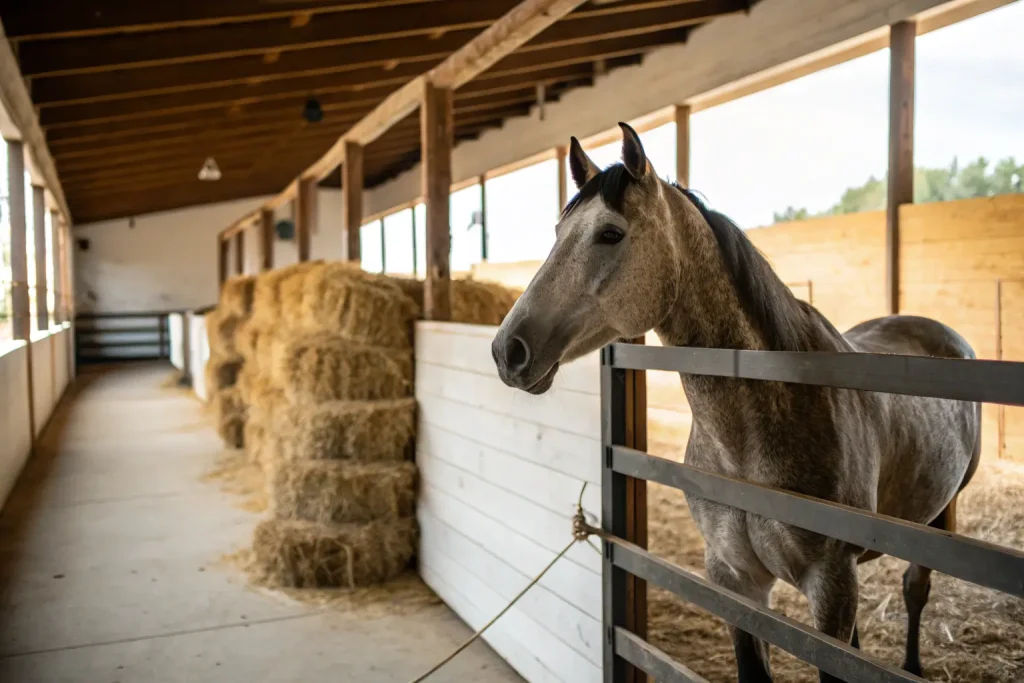
Tip 7: Observe Horse Health and Happiness at the Facility
Perhaps the most telling indicator when evaluating “horse boarding near me” options is the condition of horses already at the facility. Their appearance and behavior reflect the real-world quality of care provided.
What to Observe:
- Body condition: Do most horses maintain appropriate weight? Look for consistent body condition scores across the herd.
- Coat quality: Shiny, healthy coats typically indicate good nutrition and parasite control.
- Hoof condition: Are feet properly maintained with regular farrier care?
- Behavior: Do horses seem relaxed or anxious? Watch their response to handlers.
- Turnout appearance: Are horses dirty or clean? Excessive mud might indicate poor pasture management.
- Social dynamics: Is there evidence of appropriate turnout groupings or signs of bullying?
- Special needs accommodation: How do they handle senior horses or those requiring extra care?
During one facility tour in my “horse boarding near me” search, I noticed multiple horses with poor hoof angles despite the stable manager’s claims about regular farrier visits. This observation contradicted their marketing promises and revealed potential care deficiencies.
Ask to visit during feeding time—this provides insight into the actual routine versus what’s promised. Horses that appear agitated or show aggressive feeding behaviors might indicate inconsistent feeding schedules.
Making Your Final Decision
After thoroughly researching “horse boarding near me” options and visiting potential facilities, compiling a pros and cons list for each can help clarify your decision. Consider creating a weighted scoring system based on your priorities—perhaps safety and quality of care count triple compared to amenities in your evaluation.
Remember that the perfect boarding situation balances:
- Your horse’s physical and emotional needs
- Your budget constraints
- Your riding goals and discipline requirements
- Practical considerations like location and accessibility
Sometimes the best decision isn’t the facility with the most impressive amenities but the one where the care philosophy and daily management align with your horse’s specific needs.
Conclusion
Finding the right boarding facility through your “horse boarding near me” search requires diligence, research, and sometimes compromise. The stable you select becomes your horse’s home and significantly impacts their quality of life when you’re not present. By thoroughly evaluating safety, care protocols, amenities, costs, reputation, location, and the wellbeing of current residents, you’ll make an informed decision that serves both your horse’s needs and your equestrian goals.
Remember that the best facility for your friend’s competition warmblood might not suit your senior trail horse. Focus on finding the match that’s right for your unique situation rather than simply choosing the stable with the most impressive facilities or the highest price tag.
What’s your experience with horse boarding facilities? Have you found the perfect match through your “horse boarding near me” search? Share your insights and questions in the comments below!
Frequently Asked Questions
How much does horse boarding typically cost?
Horse boarding costs vary dramatically based on location, services, and amenities. Basic pasture boarding might range from $150-$400 monthly, while premium full-service boarding at facilities with extensive amenities can exceed $1,500-$2,000 monthly, especially in areas with high costs of living. When searching “horse boarding near me,” request detailed breakdowns of what’s included in the base price versus additional charges.
What’s the difference between full-care and self-care boarding?
Full-care boarding includes all aspects of your horse’s daily care: feeding, stall cleaning, turnout, and basic monitoring. Self-care boarding provides the space and facilities, but you’re responsible for daily feeding, cleaning, and care. Part-care arrangements fall between these options, with responsibilities divided between you and the facility. Your “horse boarding near me” search should clarify which type best suits your schedule and needs.
How often should I visit my horse at a boarding facility?
Most horse owners aim to visit at least 3-4 times weekly, though daily is ideal. Regular visits allow you to monitor your horse’s condition, maintain your relationship, and ensure care meets your expectations. When conducting your “horse boarding near me” search, be realistic about the facility’s location relative to your schedule and commitment level.
What should I bring when I move my horse to a new boarding facility?
Prepare a boarding kit that includes: your horse’s medical records and vaccination history, any medications or supplements with clear instructions, enough of their current feed for a gradual transition, familiar grooming tools, properly labeled tack and equipment, and essential contact information including your veterinarian and farrier. Most “horse boarding near me” searches should include asking each facility about their specific requirements for new arrivals.
How do I handle disagreements with barn management or other boarders?
Address concerns promptly, privately, and professionally with the appropriate person. Document interactions, refer to your boarding contract when applicable, and focus on solutions rather than complaints. If issues persist despite good-faith efforts to resolve them, it might be time to resume your “horse boarding near me” search for a better fit.

